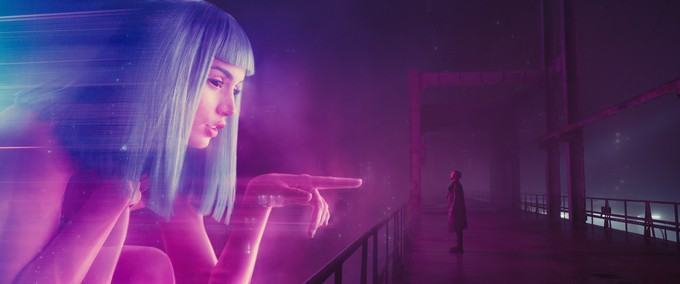Hola Dannie aqui!
With a spoiler-free review of Blade Runner 2049, from our very own Precious_Roy! I have been honestly waiting to review it because I want to see it a second time this coming Saturday... Why? Because I am not sure if I loved it, or if I think its ok. Been thinking on this one. So hope you all enjoy Precious_Roy's review, mine will be up soon!

Precious_Roy -
Sequels are tricky business, but sequels to game-changing, iconic films are nearly impossible to get right. One rare example of a sequel accomplishing this is Aliens, which took the Alien license from a Final Girl horror film to an action-packed monster movie. The change in direction was faithful to the canon of the world whilst utilizing an entirely different genre, one that was well-suited for the setting.
Blade Runner 2049 reminds me of the 2002 version of Thomas Harris’ Red Dragon. It does a good job of mimicking the 1982 auteur sensibilities of Ridley Scott, blending into the world that Blade Runner created (and Phillip K. Dick approved), just as Red Dragon recreated the drabness of the world and the vivid danger of being in Hannibal Lecter’s presence that Jonathan Demme built in The Silence of the Lambs. Blade Runner 2049 does not reconsider the approach to that world; it attempts to faithfully carry on in the same direction.
As a popcorn ‘event’ film, aside from its length, I can find no serious fault in Blade Runner 2049. I really enjoyed the visuals and the detail of the world. I enjoyed the heroes and the villains, and the entire supporting cast. The major plot twist defied my expectations and satisfied me on many levels. All in all, a great experience.
Is it a worthy successor to the original Blade Runner? No. Blade Runner 2049 fails to reach Scott’s lofty heights, and in fact repeats some of the sins of Scott’s recent work, relying too much on nostalgic reference. There is, thankfully, a hero’s arc for our protagonist, that is unexpectedly good. The film ends on a note that mirrors elements of the first film, and does with a different voice than the original.
There are some critics, such as Rebecca Hawkes at The Telegraph, who call Blade Runner 2049 a sexist movie, and I can’t argue with that. Being a bloke, and being that there is loads of gratuitous female nudity in the movie, I am sort of limited to an academic response as I try to desperately avoid the words, “Well, actually…”
But I don’t believe the movie itself is a sexist movie, any more than I believe The Silence of the Lambs is a depraved movie for showing Multiple Miggs fling bad things at Clarice Starling, or Jame Gumb working on his woman suit. If you are paying attention to the plot, it does not normalize patriarchal depictions of women; it condemns men who seek them out.
I will say that I see a theme of patriarchal oppression and matriarchal rebellion in the film, of men who believe they are architects of life and women who actually shoulder the responsibility of life.
There’s an introduction scene for the primary villain that is incredibly unnecessary and over-the-top. It involves a fully-grown woman, naked with the mind of an emerging infant, being mistreated for no apparent reason than to make us hate the villain.
There is a highly sexualized supporting character named Joi, and I can certainly understand audiences finding her presence in the plot sexist and even oppressive. The story has a highly unnecessary sex scene involving her, but her presence in the story is important and has punchline related to the male gaze.
Male gaze is, as in the original film, a thematic point, but criticism of its presence actually presents the same dilemma that the film’s plot does: when do we stop distinguishing between an imitation of a thing, and the actual thing? Is Blade Runner 2049 a film about patriarchy, or is it patriarchal: who decides? Which becomes a very meta point, given Denis Villeneuve’s imitation of Scott’s auteur in this film.
What Villeneuve failed to get right was in editing, especially where music was concerned. Vangelis themes are lost in violent fights; using a melodic synthesizer ballad detracts from the action. And the plot, which is big and winding, needed a more succinct cut—there is an extrapolation scene involving a supporting character questioning the protagonist’s implanted memory that is unnecessary, especially considering how short Deckard’s memories were in the original. I have a sneaking suspicion that, had that, the extended ‘memory’ scene, and the sex scene been cut, this film would have had a considerably-better opening weekend.
The films strengths are in understanding what fans wanted from a sequel. It steers clear of some major sci-fi tropes and completes a hero’s journey by the end, answering questions along the way about what is real and what is fantasy.
I would definitely see this film in a theatre while you can. The visuals will not translate as well to your home theatre. You will want a big screen for this kind of story.
See you soon with more reviews.
Precious_Roy
Thanks Roy!
Stay Strong, Live Good, Love Movies!
Dannie aka Pekosa Peligrosa
